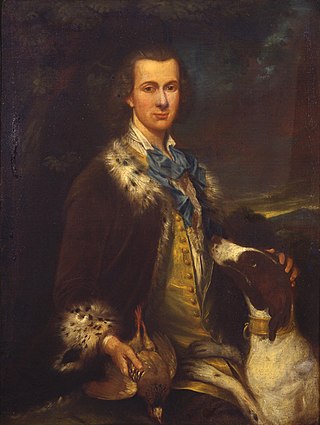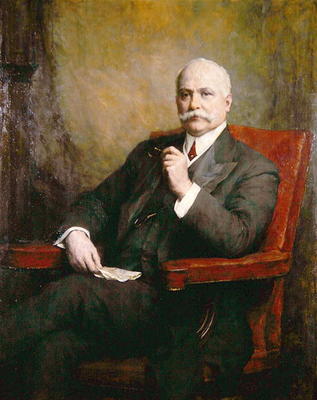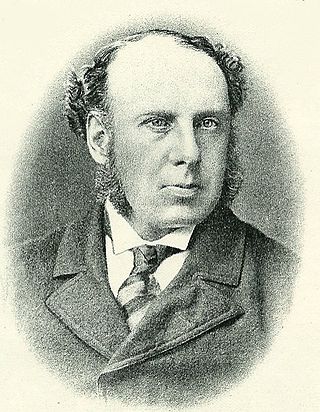
Earl of Limerick is a title that has been created twice in the Peerage of Ireland, associated first with the Dongan family, then with the Pery family.

Viscount Knutsford, of Knutsford in the County Palatine of Chester, is a title in the Peerage of the United Kingdom.

Viscount Thurso, of Ulbster in the County of Caithness, is a title in the Peerage of the United Kingdom. It was created on 11 June 1952 for the Scottish Liberal politician and former Secretary of State for Air, Sir Archibald Sinclair, 4th Baronet. His son, the second Viscount, served as Lord Lieutenant of Caithness from 1973 to 1995.

Baron Stanley of Alderley, in the County of Chester, is a title in the Peerage of the United Kingdom. It was created in 1839 for the politician and landowner Sir John Stanley, 7th Baronet. Upon his death in 1850, he was succeeded as 2nd Baron Stanley of Alderley and 8th Baronet of Alderley Hall by his son Edward, who was a prominent Liberal politician and notably served as President of the Board of Trade, Postmaster General and had in 1848 been created Baron Eddisbury, of Winnington in the County Palatine of Chester, in his own right. His wife Henrietta was a prominent campaigner for women's education. After his death, the Stanley of Alderley and Eddisbury baronies remained united; most holders have since chosen to be known as Lord Stanley of Alderley. The 3rd Baron Stanley of Alderley had a career in the Diplomatic Service; as he was childless he was succeeded by his younger brother, the 4th Baron. He was liberal member of parliament for Oldham. In 1909, the 4th Baron Stanley of Alderley acquired a further title when he succeeded his first cousin once removed, the Earl of Sheffield, according to a special remainder and thus inherited the title of 4th Baron Sheffield. After his death the titles passed to his son, the 5th Baron Stanley of Alderley. He was Liberal Member of Parliament for Eddisbury and also served as Governor of Victoria. His eldest son, the 6th Baron Stanley of Alderley, sold the family seat of Alderley Hall in 1938. He was married four times, the second time to Sylvia Ashley. On his death the titles passed to his younger brother, who preferred to be known as Lord Sheffield. He only held the titles for three months. As of 2013 the titles are held by the latter's cousin, the 9th Baron Stanley of Alderley, who succeeded his father in that year. He is the grandson of Oliver Hugh Stanley, youngest son of the 4th Baron.
Baron Gainford, of Headlam in the County Palatine of Durham, is a title in the Peerage of the United Kingdom. It was created on 3 January 1917 for the Liberal politician Jack Pease, a member of the Darlington Pease family. He notably served as President of the Board of Education from 1911 to 1915. Pease was the second son of Sir Joseph Pease, 1st Baronet, and the grandson of Joseph Pease, while Arthur Pease was his uncle and Sir Arthur Pease, 1st Baronet, Beaumont Pease, 1st Baron Wardington, and Herbert Pease, 1st Baron Daryngton, were his first cousins. The third baron was a former member of the London County Council and of the Greater London Council. As of 2013 the title is held by his younger brother, the fourth baron, an architect and town planner; County Planning Officer for Ross and Cromarty 1967–1975 and Scottish Office Inquiry Reporter 1978–1993.

Baron St Levan, of St Michael's Mount in the County of Cornwall, is a title in the Peerage of the United Kingdom. It was created on 4 July 1887 for the former Member of Parliament Sir John St Aubyn, 2nd Baronet, becoming John St Aubyn, 1st Baron St Levan. He had previously represented Cornwall West in House of Commons as a Liberal and St Ives as a Liberal Unionist. He was succeeded by his eldest son, the second Baron, who was a Colonel and Honorary Brigadier-General in the Grenadier Guards. On his death the titles passed to his nephew, the third Baron, the son of the Hon. Sir Arthur James Dudley Stuart St Aubyn (1867–1897), second son of the first Baron. The third baron was succeeded in 1978 by his eldest son, the fourth baron, who had served with the Royal Navy at Dunkirk and in a minesweeper in Arctic Convoys during World War II and was awarded the Distinguished Service Cross (DSC). As of 2014, the titles are held by the fourth Baron's nephew, the fifth Baron, who succeeded in 2013.
Baron Congleton, of Congleton in the County Palatine of Chester, is a title in the Peerage of the United Kingdom. It was created in 1841 for the Whig politician and former Secretary at War and Paymaster of the Forces Sir Henry Parnell, 4th Baronet. His eldest son, the second Baron, devoted his life to religious work and was an early member of the Plymouth Brethren. The latter was succeeded by his younger brother, the third Baron. He served in the Royal Navy and fought at the Battle of Navarino in 1827. His eldest surviving son, the fourth Baron, was a major-general in the British Army and served in the Crimean War and in the Anglo-Zulu War. The latter's eldest son, the fifth Baron, was killed in action in Ypres Salient during the First World War and was succeeded by his younger brother, the sixth Baron. As of 2015, the titles are held by the latter's grandson, the ninth Baron, who succeeded his father in 2015.
Baron Cawley, of Prestwich in the County Palatine of Lancaster, is a title in the Peerage of the United Kingdom. It was created in 1918 for the Liberal politician Sir Frederick Cawley, 1st Baronet. He had previously represented Prestwich in the House of Commons and served as Chancellor of the Duchy of Lancaster from 1916 to 1918. Before his elevation to the peerage, Cawley had been created a baronet, of Prestwich in the County Palatine of Lancaster, in the Baronetage of the United Kingdom, in 1906. His grandson, the third Baron, notably served as Deputy Chairman of Committees in the House of Lords from 1958 to 1967. As of 2011 the titles are held by the latter's eldest son, the fourth Baron, who succeeded in 2001.

The Hobhouse Baronetcy, of Chantry House in the parish of Bradford-on-Avon in the County of Wiltshire and of Westbury College in the County of Gloucester, is a title in the Baronetage of the United Kingdom. It was created on 22 December 1812 for Benjamin Hobhouse, a wealthy brewer and member of parliament for Bletchingley, Grampound and Hendon. His eldest son, the second Baronet, was a prominent writer and Liberal politician and notably served as Chief Secretary for Ireland and as President of the Board of Control. In 1851 he was raised to the peerage as Baron Broughton, of Broughton-de-Gyffard in the County of Wiltshire. However, he had no sons and on his death the barony became extinct, while he was succeeded in the baronetcy by his nephew, the third Baronet. The latter's son, the fourth Baronet, was also a noted Liberal politician and held office as Chancellor of the Duchy of Lancaster and as Postmaster General.

The Strachey baronetcy, of Sutton Court in the County of Somerset, England, is a title in the Baronetage of the United Kingdom. This family was originally seated at Walden, Essex, where William Strachey was living under the rule of Edward VI. Later they moved to Surrey and at last settled at Sutton Court, Somerset. The title was created on 15 June 1801 for the politician and civil servant Henry Strachey. Sir Henry was private secretary to Lord Clive during his last expedition to India in 1764. He also took part in negotiations for peace with North America where he assisted the kings commissioners at Paris. He died in 1809 and was succeeded by his eldest son Henry, the second Baronet Strachey. His great-grandson, the fourth Baronet, was a Liberal politician. On 3 November 1911, he was created Baron Strachie, of Sutton Court in the County of Somerset, in the Peerage of the United Kingdom. He later served as Paymaster-General. The peerage became extinct on the death of his son, the second Baron, in 1973. The late Baron was succeeded in the baronetcy by his first cousin once removed, the sixth Baronet. He was the son of John Strachey, son and namesake of John Strachey, second son of the third Baronet. Strachey died January 2014 and did not use his title. Also, he had not successfully proven his succession and was therefore not on the Official Roll of the Baronetage, with the baronetcy considered dormant.

There have been three baronetcies created for persons with the surname Holden, all in the Baronetage of the United Kingdom. Two of the creations are extant as of 2010.
There have been two baronetcies created for members of the Ropner family, both in the Baronetage of the United Kingdom. Both creations are still extant. The Ropner family is of German descent.
There have been three baronetcies created for persons with the surname Lees, all in the Baronetage of the United Kingdom.
The Barran Baronetcy, of Chapel Allerton Hall in Chapel Allerton in the West Riding of the County of York and Queen's Gate, St Mary's Abbot, in Kensington in the County of London, is a title in the Baronetage of the United Kingdom. It was created on 11 February 1895 for the merchant and Liberal politician John Barran. He represented Leeds and Otley in the House of Commons. He was succeeded by his grandson, the second Baronet. He sat as Liberal Member of Parliament for Hawick and served as Parliamentary Private Secretary to Prime Minister H. H. Asquith.
There have been seven baronetcies created for persons with the surname Edwards, three in the Baronetage of England and four in the Baronetage of the United Kingdom. Only one creation is extant as of 2007.
There have been five baronetcies created for persons with the surname Evans, one in the Baronetage of Ireland and four in the Baronetage of the United Kingdom. All of the baronetcies are now extinct.
The Forwood Baronetcy, of The Priory, Gateacre, in the parish of Childwall in the County Palatine of Lancaster, was a title in the Baronetage of the United Kingdom. It was created on 5 September 1895 for the Conservative politician Sir Arthur Forwood, 1st Baronet, son of wealthy merchant Thomas Friend Brittain Peploe Forwood, and brother of Sir William Bower Forwood and Ernest Harrison Forwood. He served as Parliamentary and Financial Secretary to the Admiralty from 1886 to 1892. The Forwood Baronetcy became extinct on the death of the fourth Baronet in 2019.

There have been two baronetcies created for persons with the surname Houldsworth, both in the Baronetage of the United Kingdom. One creation is extant as of 2007.

The Dilke Baronetcy, of Sloane Street in the County of Middlesex, is a title in the Baronetage of the United Kingdom. It was created on 22 January 1862 for the Liberal politician Wentworth Dilke. Apart from his political career, he played an important part in the international exhibititions in London in 1851 and 1862. Dilke was the son of the critic and writer on literature Charles Wentworth Dilke. He was succeeded by his son, the second Baronet. He was also a Liberal politician and served under William Ewart Gladstone as Parliamentary Under-Secretary of State for Foreign Affairs from 1880 to 1882 and as President of the Local Government Board from 1882 to 1885. However, his political career was effectively ended in 1885 after a well-publicised divorce case.

The Winnington Baronetcy, of Stanford Court in the County of Worcester, is a title in the Baronetage of Great Britain.











